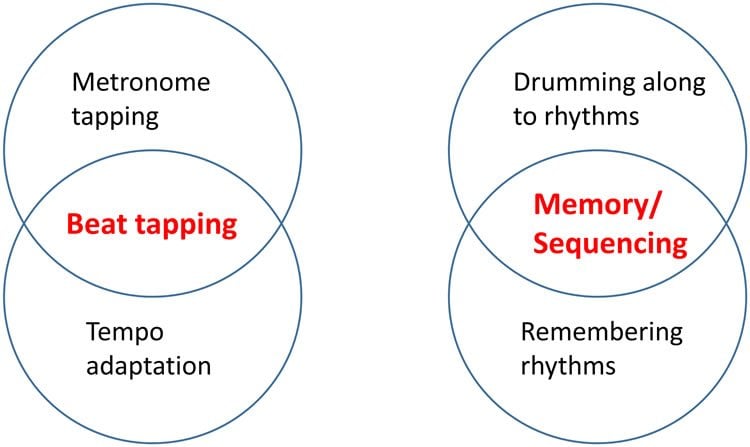Tapping to a beat and remembering rhythms may not be related skills, which may also have implications for language ability, according to a study published September 16, 2015 in the open-access journal PLOS ONE by Adam Tierney and Nina Kraus from Northwestern University.
Rhythms, or patterns of sound and silence in time, may play a vital role in both speech and music. However, not knowing how rhythm skills relate to each other has limited researchers’ understanding of how language relies on rhythm processing. In particular, it is unknown whether all rhythm skills are linked together, forming a single broad rhythmic competence, or whether there are multiple separate rhythm skills. Using a battery of two beat tapping and two rhythm memory tests, the authors of this study recruited over 60 teenage participants to investigate whether beat tapping and rhythm memory/sequencing form two separate clusters of rhythm skills.

The researchers found that tapping to a metronome and the ability to adjust to a changing tempo while tapping to a metronome seem to be related skills. The ability to remember rhythms and to drum along to repeating rhythmic sequences may also be related. However, the authors found no relationship between beat tapping skills and rhythm memory skills, and they suggest that these may actually be separate skills. The authors also hope that this discovery will inform future research disambiguating how distinct rhythm competencies track with specific language functions.
Funding: This research is funded by NSF SMA1015614, NIH DC009399, the Mathers Foundation, the National Association of Music Merchants, and the Knowles Hearing Center, Northwestern University. The funders had no role in study design, data collection and analysis, decision to publish, or preparation of the manuscript.
Source: Kayla Graham – PLOS
Image Credit: The image is credited to Adam Tierney, Nina Kraus/PLOS ONE
Original Research: Full open access research for “Evidence for Multiple Rhythmic Skills” by Adam Tierney and Nina Kraus in PLOS ONE. Published online September 16 2015 doi:10.1371/journal.pone.0136645.g001
Abstract
Evidence for Multiple Rhythmic Skills
Rhythms, or patterns in time, play a vital role in both speech and music. Proficiency in a number of rhythm skills has been linked to language ability, suggesting that certain rhythmic processes in music and language rely on overlapping resources. However, a lack of understanding about how rhythm skills relate to each other has impeded progress in understanding how language relies on rhythm processing. In particular, it is unknown whether all rhythm skills are linked together, forming a single broad rhythmic competence, or whether there are multiple dissociable rhythm skills. We hypothesized that beat tapping and rhythm memory/sequencing form two separate clusters of rhythm skills. This hypothesis was tested with a battery of two beat tapping and two rhythm memory tests. Here we show that tapping to a metronome and the ability to adjust to a changing tempo while tapping to a metronome are related skills. The ability to remember rhythms and to drum along to repeating rhythmic sequences are also related. However, we found no relationship between beat tapping skills and rhythm memory skills. Thus, beat tapping and rhythm memory are dissociable rhythmic aptitudes. This discovery may inform future research disambiguating how distinct rhythm competencies track with specific language functions.
“Evidence for Multiple Rhythmic Skills” by Adam Tierney and Nina Kraus in PLOS ONE. Published online September 16 2015 doi:10.1371/journal.pone.0136645.g001






